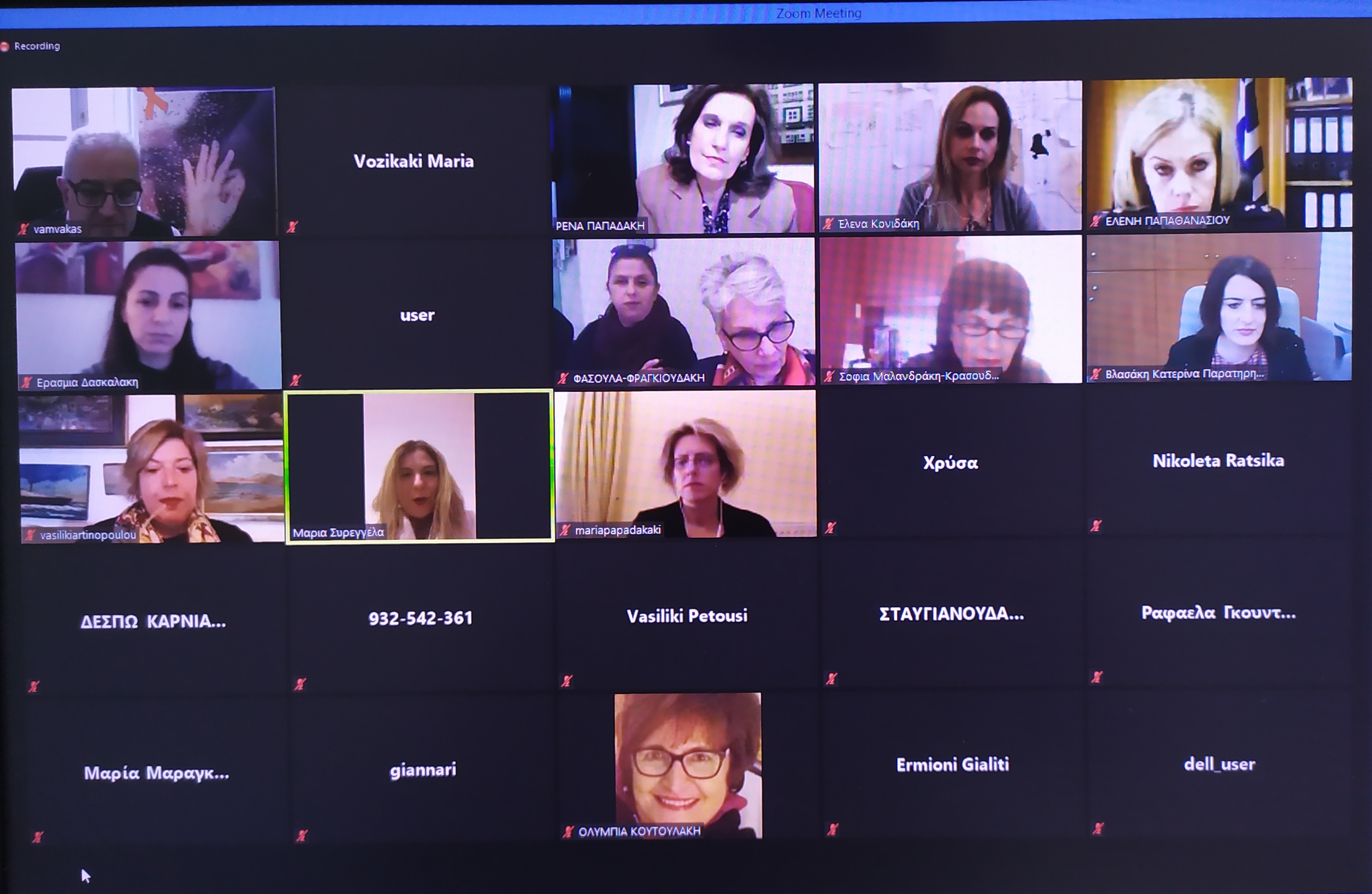Teleconference for "Violence against Women: Empirical data and intervention practices"
The 1st Teleconference of the Region of Crete-Regional Committee for Gender Equality (PEPIS Crete) was held with great participation by the public, in co-organization with the Municipal Committee for Gender Equality of Heraklion (DEPIS Heraklion), on "Violence against Women: Empirical data and intervention practices".
According to the Deputy Regional Governor of Public Health and Social Policy and President of PEPIS Crete Lambros N. Vamvakas, the meeting highlighted the fact that violence against women is a global phenomenon, which occurs in every society, regardless of economic, social and cultural development, as a result of historically deep-rooted perceptions and attitudes that contribute to the perpetuation of gender stereotypes and practices and gender-based violence. The organizations that participated in the 16-day campaign of the Region of Crete, in the framework of which the day took place, hope that these actions will contribute to the fight against all forms of violence against women and to the elimination of the "culture" of violence and discrimination, as a basic condition for achieving substantial equality between men and women and the formation of a society of solidarity, mutual respect and social justice.
In particular, the Secretary General of Family Policy and Gender Equality, Maria Syregela, highlighted the importance of the work carried out by the structures of the Secretariat Network, for the effective support and protection of women victims of violence, but also their children and in particular Women's Counseling Centers and Women's Hostels, which have been set up throughout the country, as well as the Panhellenic Telephone Line SOS 15900, which offers important services 24 hours, 365 days a year. Ms. Syregela also stressed that the elimination of violence against women is one of the strategic goals of the European Equality Commission and the Council of Europe. Finally, Ms. Syregela praised the work of PEPIS (Gender Equality Regional Committe) Crete and the DEPIS (Gender Equality Municipal Committee) of Heraklion and stressed that the Local Government has an important role to play in the planning and implementation of actions to prevent and eliminate violence against women.
According to the empirical data presented by Vasiliki Artinopoulou, Professor of Criminology at Panteion University, regarding the effects of the first general ban on the occurrence of cases of domestic abuse, the coronavirus pandemic contributed to the reproduction of pre-existing women, but did not primarily create domestic violence. In fact, according to the testimonies of the women themselves, of those who stated that there was domestic violence, 98.8% had been abused before the pandemic. Of these women victims of domestic abuse, 63% said they had never asked for help, neither from the Police, nor from any other body. Therefore, it seems that the largest percentage of women victims of violence still manage alone "the trauma of victimization", "in his home and in the presence of child witnesses". This fact indicates that there is a large category of "invisible victims" who are next to us, but we do not know them and it is to these women that we should focus our efforts to raise awareness, so that they seek support and help.
For her part, Vasiliki Petousi, Associate Professor at the Department of Sociology of the University of Crete, Director of the Gender Laboratory and full member of PEPIS Crete, as a representative of the Higher Education Institutions of the island, highlighted the structural dimensions that have in its production and reproduction. Ms. Petoussi stressed the fact that "gender inequality is a cause, but also a cause of gender violence", which has historically been structured in unequal power relations and in the patriarchal hierarchical organization of society. As far as Greece is concerned, as Mrs. Petousi pointed out, the achievement of the goal of equality between men and women "is unfortunately slow! Much more! " Our country, according to the Gender Equality Index for 2020, remains in last place, among the 28 countries of Europe, while it is 15.7 points behind the European average.
The Sociologist, Head of the Regional Observatory of Social Inclusion of the Region of Crete, Katerina Vlasaki, pointed out, the incidents of domestic violence on the island, according to the "SOS Line 15900", almost quadrupled in April 2020 compared to March 2020. Also, one in two cases of violence against women reported during the period 2011-2020 concerned the Regional Unit of Heraklion. From 2011 to 2020, Crete counts 1,447 cases of violence, while from 2018 until today, there were about 200 to 218 cases per year - on average. However, the above data are only a part of the incidents of violence against women in Crete, as there is a large "invisible part of violence against women" which is not recorded.


